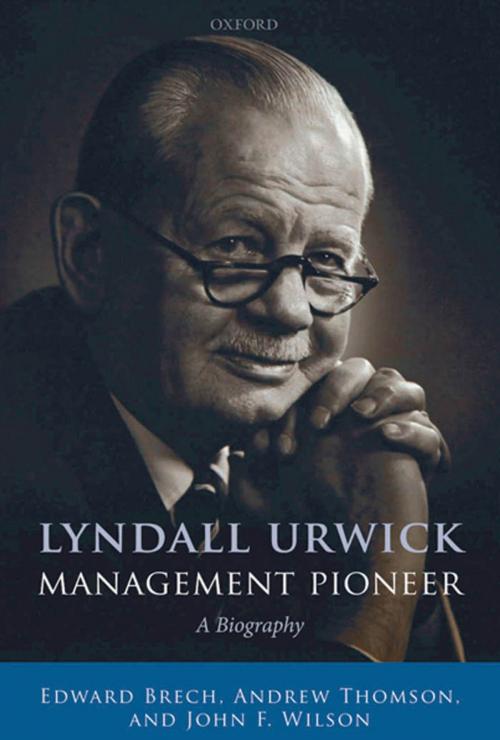Lyndall Urwick, Management Pioneer
A Biography
Business & Finance, Business Reference, Corporate History, Biography & Memoir| Author: | Edward Brech, Andrew Thomson, John F. Wilson | ISBN: | 9780191613791 |
| Publisher: | OUP Oxford | Publication: | July 8, 2010 |
| Imprint: | OUP Oxford | Language: | English |
| Author: | Edward Brech, Andrew Thomson, John F. Wilson |
| ISBN: | 9780191613791 |
| Publisher: | OUP Oxford |
| Publication: | July 8, 2010 |
| Imprint: | OUP Oxford |
| Language: | English |
Lyndall Urwick was the dominant figure in British management between the late 1920s and the early 1960s. His writings and his passion in pursuit of management as a scientific and systematic activity rather than the rule-of-thumb approach to decision-making all too prevalent in Britain exercised a huge influence on management at the time; and ultimately management as we know it today. Urwick was greatly affected by his experience of the First World War and at Rowntree's. He went on to become Director of the International Management Institute between 1928-33, before forming a very influential management consultancy, Urwick Orr and Partners, which he chaired for the rest of his career. He was also deeply involved with almost all the institutional developments in British management up to the 1960s, including the Management Research Groups, the Institute of Industrial Administration, the British Institute of Management, the Administrative Staff College, and the management education side of the Anglo-American Council on Productivity. In pursuit of what he called his 'mission at large', he gave hundreds of talks in his lucid and charismatic style, many of which were published as articles or booklets. These talks were not only in Britain but in Australia after his emigration there in 1961, in America, where he became the best-recognized foreign exponent of management, and in a range of countries around the world. But he will probably be best remembered for his writings, not only on organization theory, where he is recognized as a great synthesizer and leader in the classical school, but on a wide range of other topics, including the history of management, leadership, marketing, and management education and development. Truly he was a man of many parts.
Lyndall Urwick was the dominant figure in British management between the late 1920s and the early 1960s. His writings and his passion in pursuit of management as a scientific and systematic activity rather than the rule-of-thumb approach to decision-making all too prevalent in Britain exercised a huge influence on management at the time; and ultimately management as we know it today. Urwick was greatly affected by his experience of the First World War and at Rowntree's. He went on to become Director of the International Management Institute between 1928-33, before forming a very influential management consultancy, Urwick Orr and Partners, which he chaired for the rest of his career. He was also deeply involved with almost all the institutional developments in British management up to the 1960s, including the Management Research Groups, the Institute of Industrial Administration, the British Institute of Management, the Administrative Staff College, and the management education side of the Anglo-American Council on Productivity. In pursuit of what he called his 'mission at large', he gave hundreds of talks in his lucid and charismatic style, many of which were published as articles or booklets. These talks were not only in Britain but in Australia after his emigration there in 1961, in America, where he became the best-recognized foreign exponent of management, and in a range of countries around the world. But he will probably be best remembered for his writings, not only on organization theory, where he is recognized as a great synthesizer and leader in the classical school, but on a wide range of other topics, including the history of management, leadership, marketing, and management education and development. Truly he was a man of many parts.















